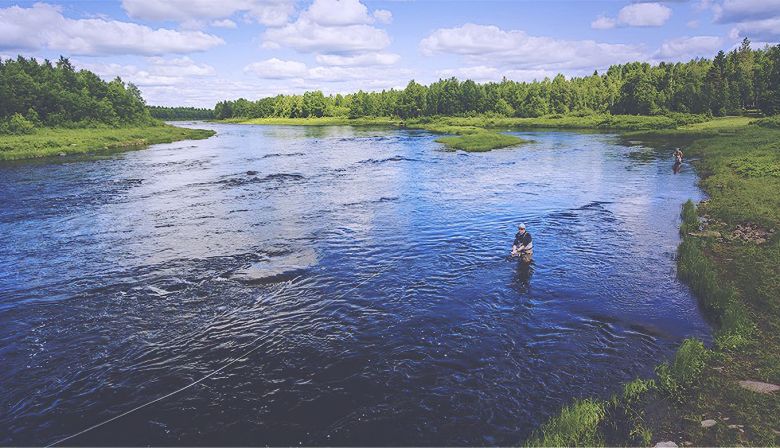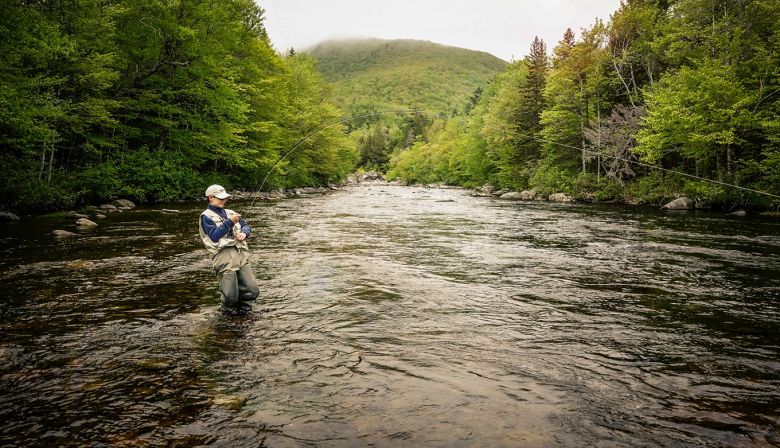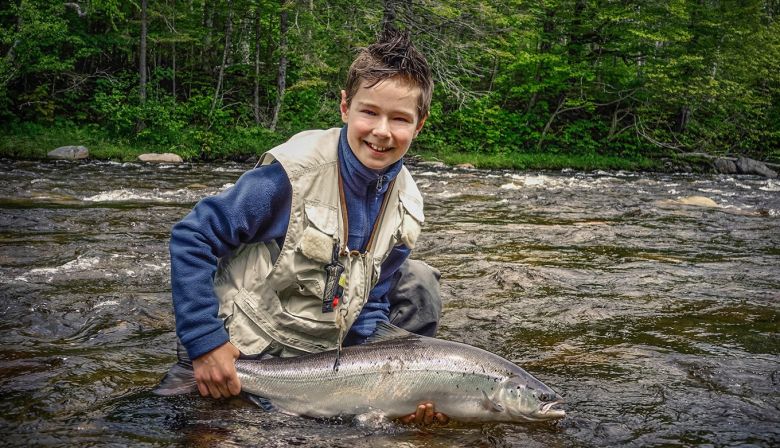
Subscribe & stay up-to-date with ASF


According to Kevin Case, Acting Director, Fish and Wildlife, said those already in the locations would need to leave, and all reservations would not be honoured, due to the extremely high forest fire danger. Those with immediate or later reservations would be reimbursed, he said in an email to ASF’s Neville Crabbe.
Penobscot –
Last numbers from Sat., June20 have been included, replacing the June 15 numbers from Jason Lavalliere of Maine DNR.Good News on Early Salmon Returns
From many areas, including Maine, Restigouche, Gaspé and Newfoundland and other areas the early signs of of Atlantic salmon returns are positive.
We need to be cautioned that the water levels overall are dropping, and temperatures may rise unduly, but still, the signs are good so far.
So many things are imponderable. What has the at-sea survival been like. What actual depredations did smolt suffer leaving the Miramichi estuary in the year-classes now returning.
The difficulty in attempting to predict runs is that there are so many factors affecting the wild Atlantic salmon population dynamics both in their native streams and far out on ocean feeding grounds.
We are still discovering more about Atlantic salmon with every passing day, month and year. For many anglers on the rivers it matters, and it should. There are not the human resources to address every issue of Atlantic salmon everywhere. But knowing more details of the Atlantic salmon and their lives does help us know better where to place conservation resources, and to remind governments where to best apply their regulatory responsibilities.
Every Atlantic salmon returning to the river to spawn is precious, and every one seen in a river gives another person a bond with the species. These precious links between individuals on the rivers and the Atlantic salmon are fundamental to maintaining the heritage associated with this charismatic fish.
Borders and Licenses
It has been officially announced this week that the border between Canada and the U.S. will remain closed to most travellers until at least July 21.
On licenses, the Newfoundland and Labrador government has announced it will be selling non-resident salmon angling licenses, but this is likely to be of use only to those non-residents already in the province for one reason or another.
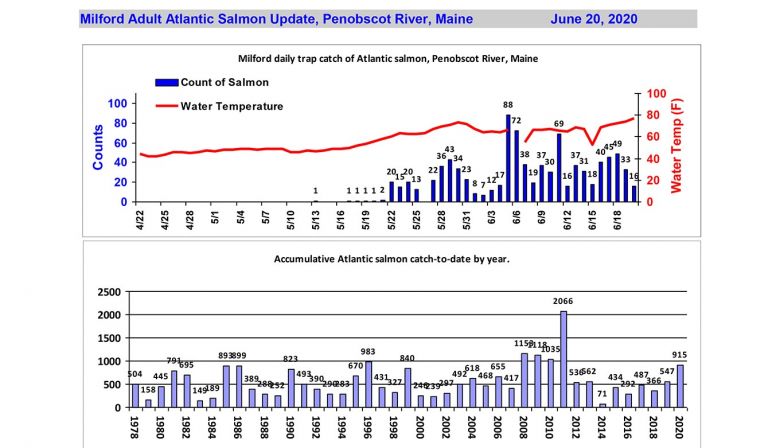
Penobscot
Jason Valliere, Maine DMR Biologist, updated salmon figures on Sat. June 20 in laste afternoon:
915 salmon at Milford plus 3 at Orono makes 918 total for the Penobscot
To this point 815 Atlantic salmon have been measured, and allowed to proceed upstream. There have been 103 taken to Craig Brook National Fish Hatchery at East Orland, ME. It will be interesting to see if the release of these 815 salmon benefits the species, but certainly the river conditions until this week have been good for Atlantic salmon to survive, and to continue on their upstream migration. But this week, Jason Valliere notes the Penobscot is running at 79 F., or 26 C.
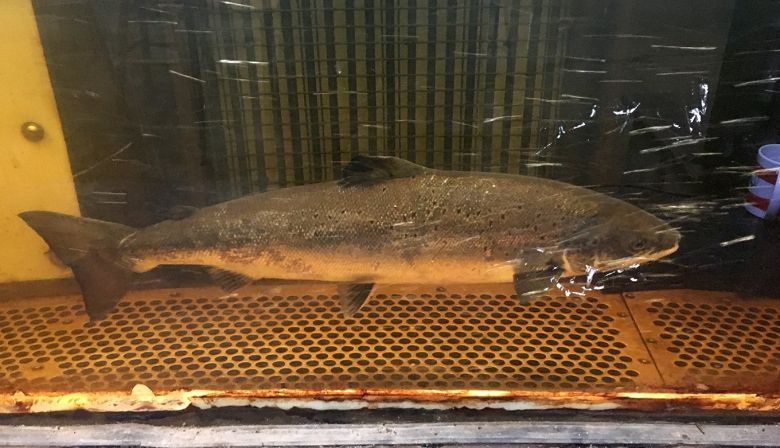
To June 14 there have been 23 Atlantic salmon counted.
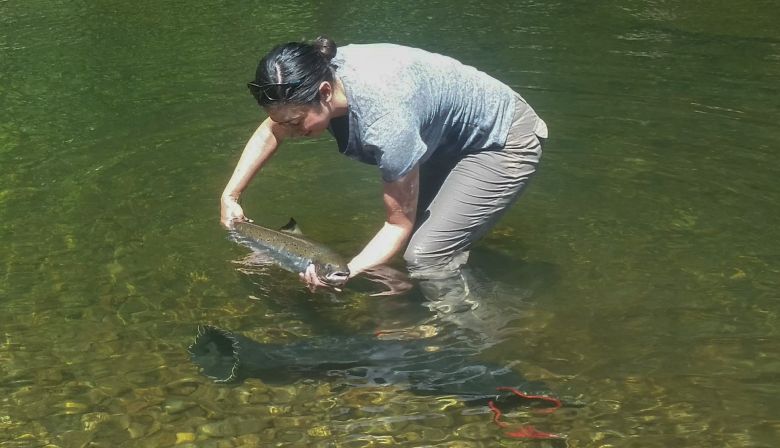
The year 2020 is turning into a remarkably good year for the Atlantic salmon in this River. The return of 33 is the highest return in the recent data series from 2010, does only refer to the year to June 17.
Jennifer Noll of Maine DMR, reporting on the week:
Temperatures have been slowly rising on the lower Kennebec this week but are expected to jump by the weekend with the hot, dry weather expected. Again, flows are very low on the mainstem Kennebec. According to the USGS gage in Sidney, current flow conditions are at 2,140 cfs, which is the lowest discharge recorded for this date based on 34 years of data.
From Tom Moffatt: It needs to be noted that the fishway at the Lockwood Dam is poorly designed, under most conditions is hard for the Atlantic salmon to find, and perhaps this year’s higher numbers are because salmon can find the fishway in times of lower flow. The Kennebec still has a long way to go to be considered a river with restored migration of sea-going species.
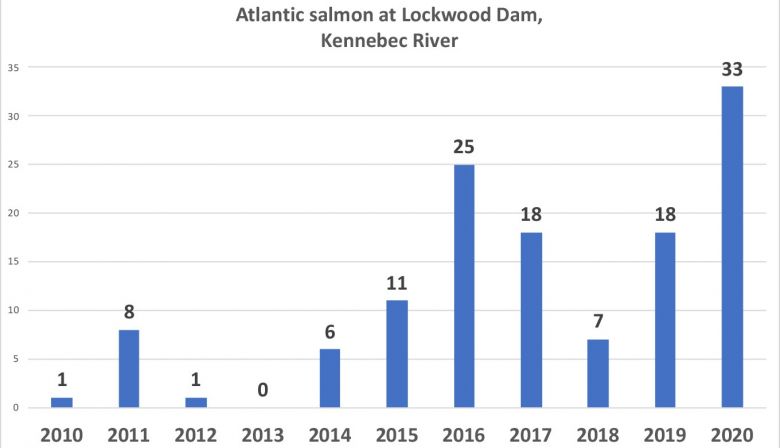
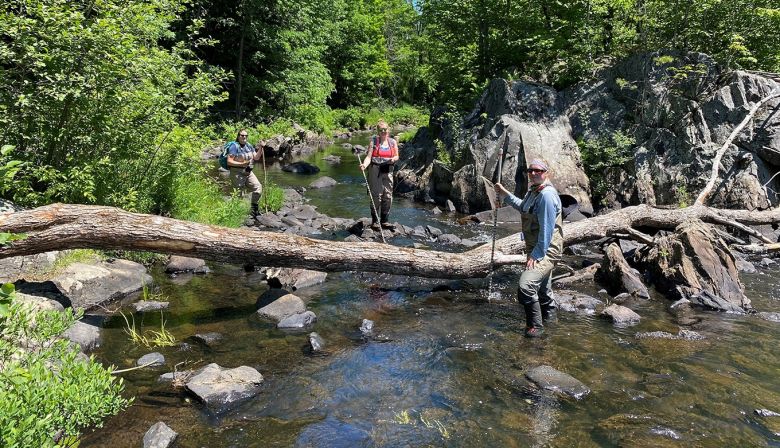
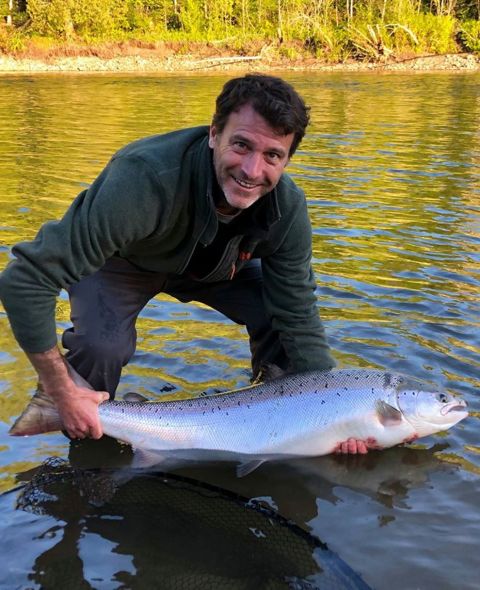
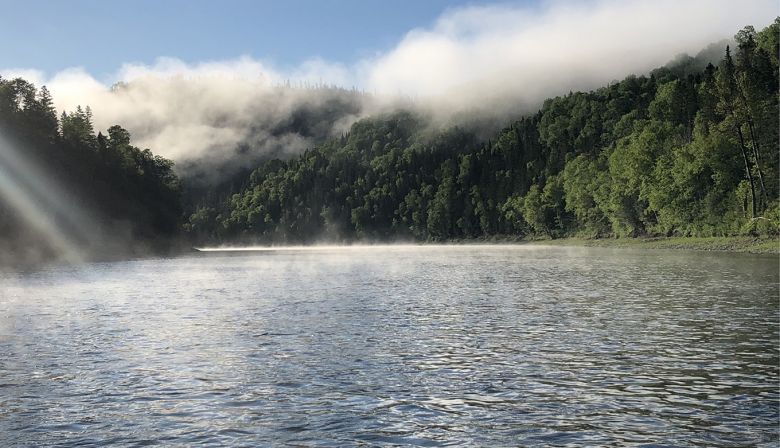
Some beautiful and large Atlantic salmon have been showing up in the Restigouche system, which certainly brings hope for the 2020 returns. At the same time, many camps are closed for the year, due to the impact on travel of the Covid-19 Pandemic.
Nathan Wilbur was on the Restigouche a few days ago:
Salmon are making their way into New Brunswick rivers and we are hearing some positive reports of anglers hooking up on a variety of rivers.
It’s a great time to be on the water with cold, clean June flow and chrome salmon. Can’t beat it.
Rivers are getting low and we need rain, it’s been unseasonably dry over the past weeks and certainly a big flush of water would continue to bring the salmon into home waters.
With the covid travel restrictions on, we’re all dreaming of our favourite salmon river at this time of year, but it’s a great opportunity to get out and explore local waters. You may find a hidden gem or renewed passion in waters close to home, whether it be a salmon river, trout stream, or backwoods lake.
New Book on the Restigouche River
Philip Lee has just published a new 272-page book on the Restigouche River with Goose Lane Editions that just came out 19 June 2020. It is also available in Kindle on Amazon.
Philip Lee also wrote Home Pool: The Fight to Save the Atlantic Salmon.


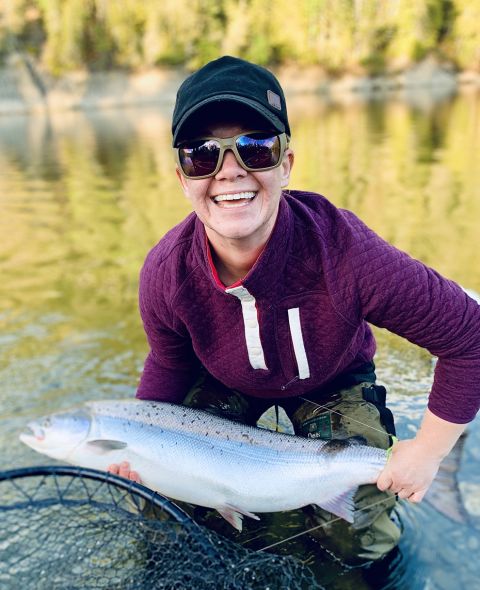
Brock Curtis
of Curtis Miramichi Outfitters says:Our rivers continue to drop and rain would be a welcome on some of our tributaries.
Not many reports on salmon landed here on the Main Southwest Miramichi. We are getting some reports from anglers hooking the odd salmon on the tributaries along with nice trout.
Any salmon that came into the Southwest Miramichi seem to have headed upriver and are not holding yet.
Most salmon fisherman are waiting for the late June early July runs to come in and start holding in the cold water pools.
Conditions are still good here on the main river in the Blackville area.
We could use some rain but it isn’t bad for wading and salmon fishing. Just a waiting game now for the next runs to come in and start holding in the pools.
Quite a few bass fisherman around and some seem to be doing okay.
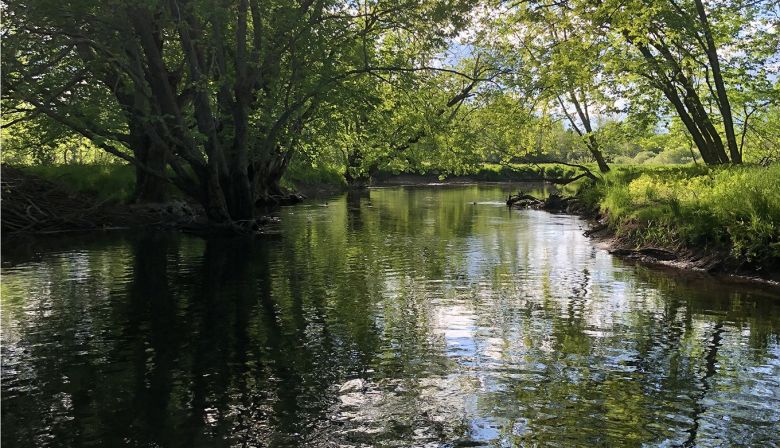
The boundary river between the United States and Canada may still be a barrier to travel. But for alewives the river is indeed a “four-lane highway”. The St. Croix International Waterway Commission reports that for the week ending June 6 there have been 563,055 pass through the Milltown fishway. They are measured using a video system, rather than by hand.
No sign of Atlantic salmon however.

Greg Lovely writes:
The water levels are still good and both Atlantic salmon and trout are being caught. But hopefully we get rain to maintain these perfect fishing conditions as water levels are falling.
It is always nice to get “the monkey of your back” as my friends and I call it, which is when you catch the first fresh salmon of the year. Although our salmon fishing licenses do not specify barbless flies for fishing salmon this year, we at the Margaree Salmon Association are still going to advocate barbless flies as the way to go.
Notes on the Drone Images
These drone photos were taken by my son, Alexander Lovely. The drone left my house and travelled down the river almost to Eagles Nest Pool. In one of the photos there is a salmon fisher.
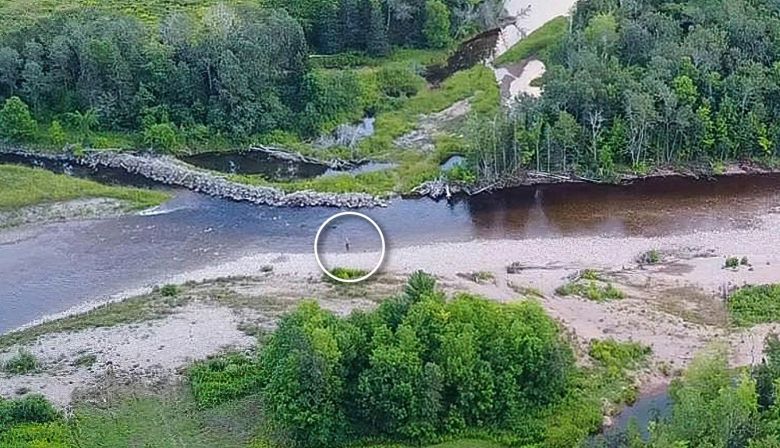
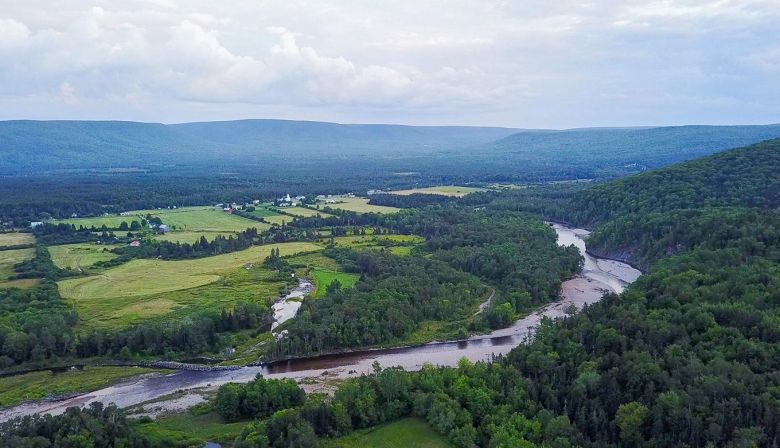
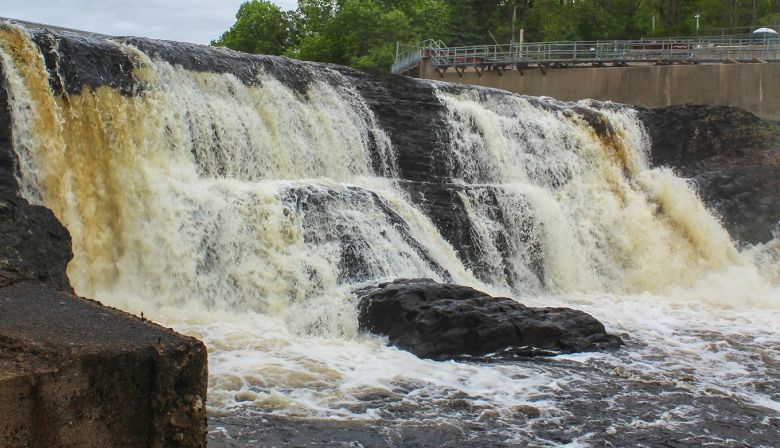
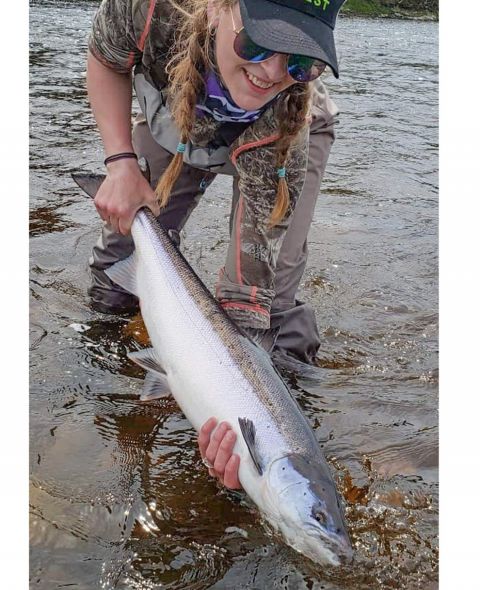
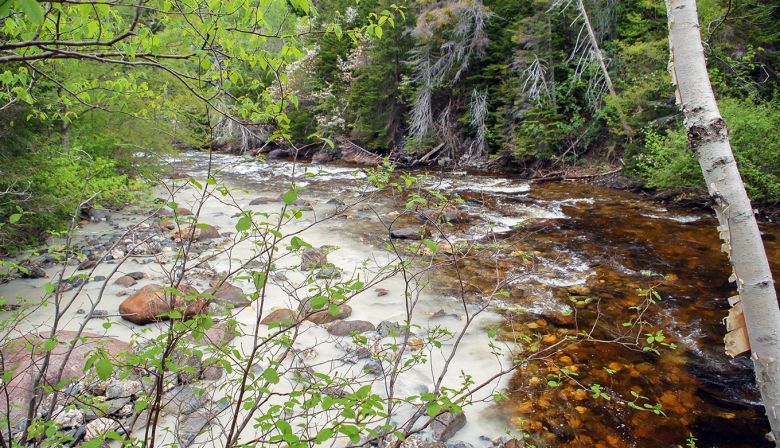
As of next week, the provincial government is selling Non-Resident Salmon Angling Licenses. With the difficulty of actually travelling to Newfoundland and Labrador, these are presently only of use for non-residents already in the province.
Keith Piercey gives an update from the Newfoundland west coast:
The raging high waters this Spring subsided somewhat, and anglers took quick advantage.
The fishing is very good on several Bay St. George Rivers. Southwest Brook, one of the earliest, brought many reports of successful trips (with some usual not-so-great days in between) as a mixed run of grilse and salmon moved in.
A party of two had 11 on during one trip to Tuck’s Pool on Southwest Brook. Another individual was returning home from Port aux Basques and had an hour to spare, so he headed for The Big Dribble on Robinson’s River. When he arrived at the pool a senior angler said he was using the pool (meaning he had to go somewhere else). Right move!! He went downstream a short distance and in 30 minutes had on and lost 4 fish!
Several anglers tried Big Falls on the Humber and I am informed that they didn’t see a salmon. The Humber had quite a volume of water this year. Levels have dropped considerably on the upper part, while Lower Humber takes longer to drop due to the extra water flowing into Deer Lake from the penstocks at Deer Lake Power.
Salmon Trap on Corner Brook Stream needs quick repairs
Things didn’t go so well following a major clean-up at the Corner brook Stream. The upper section was renewed last summer and things looked rosy, or so we thought. The right support in the trap snapped and left it with a significant list (photo). DFO has it listed on its priority list for repairs and have prioritized other fishways for work as well. Given the run on Corner Brook Stream doesn’t start until the end of June we are slotted in behind others where runs have started. This year Rogers Cable will be streaming video in real-time from the trap. The exterior equipment is already in place.

COVID-19 forced DFO to re-think the installation of counting fences in the province. All field work was put off until June 15th. The counting fence (DIDSON) on rivers like Harry’s is normally installed during the latter part of May. However due to the distancing factor it wasn’t possible to start installation. By now DFO would have almost three weeks of data gathered. Fishways will get most attention for now.

Don Ivany, ASF Director of Programs for Newfoundland and Labrador, was travelling up to the Strait of Belle Isle to deploy arrays of tracking receivers between the NL and Labrador shores, but along the way took images of many of the rivers that cross the highway. He says:
I have been on the Northern Peninsula all this week putting out our tracking receivers and basically working from daylight to dark. However, on the drive north on Monday I took photos of rivers along the Northern Peninsula.
Water levels on most of these rivers are still pretty high and few people are fishing. However I have received reports that a few fish have been caught on Castor River and St. Genevieve River. Likewise fish are being hooked on Beaver Brook near Main Brook. Water levels are good for fish on Big East but I didn’t see anyone fishing there and have not heard of any fish being caught yet on this river.
I know the water levels have receded on the Humber and I understand a few fish have been hooked there as well. Because of the intense work deploying the tracking receivers, I haven’t talked to anyone fishing in Central Newfoundland rivers or rivers on the South Coast or Avalon Peninsula.
In Labrador levels are still high, and I have not heard of any fish hooked there yet, but the season only opened on June 15. I suspect we may get some early reports from those rivers during the next week or two.
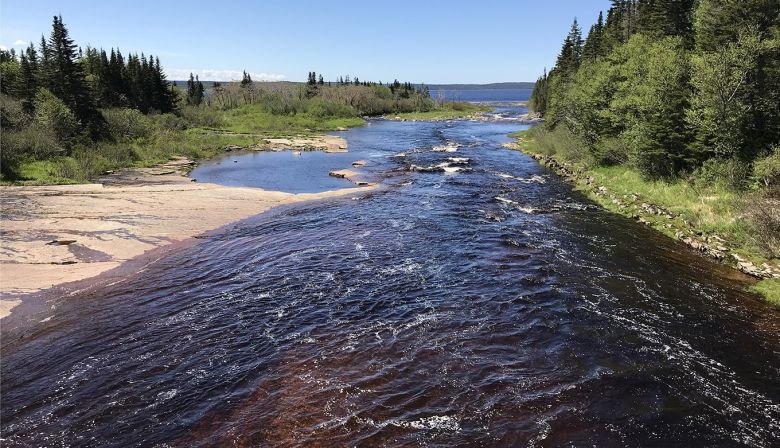
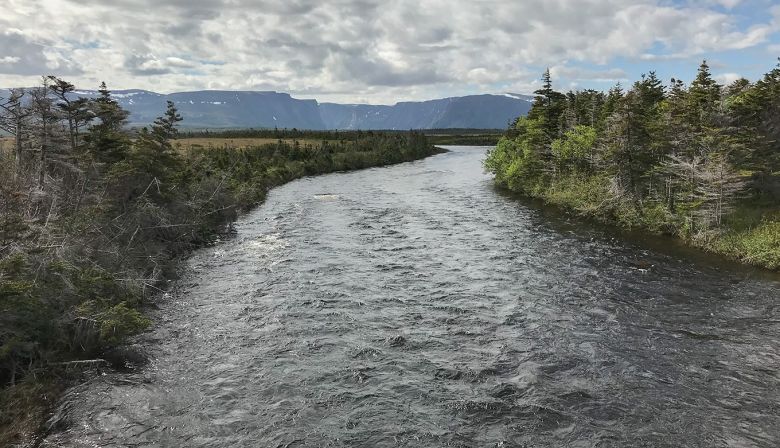

In Quebec again this week, water level declines remain a topic of conversation, but the news on returning salmon continues to be encouraging.
Lower Saint-Lawrence rivers such as the Causapscal have kept up the momentum from last week despite rapidly falling water flow. Anglers have been graced with many cooperative fish to date, releasing more salmon than harvested. 39 salmon have been released compared to 35 at the same date last year.

The first salmon entered the system on June 6
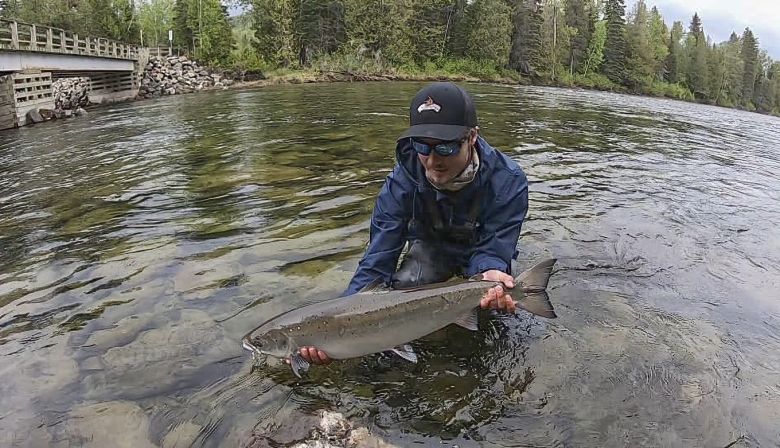
Results from the Micmac Camp are proudly displaying many fine salmon on their Facebook page.
https://www.facebook.com/Micmac-Camp-199352133438454
The APRM (Moisie River Protection Association) is reporting to date, for the section of the river they manage, 40 salmon being landed, of which 29 have been released, 10 killed and 1 kelt.
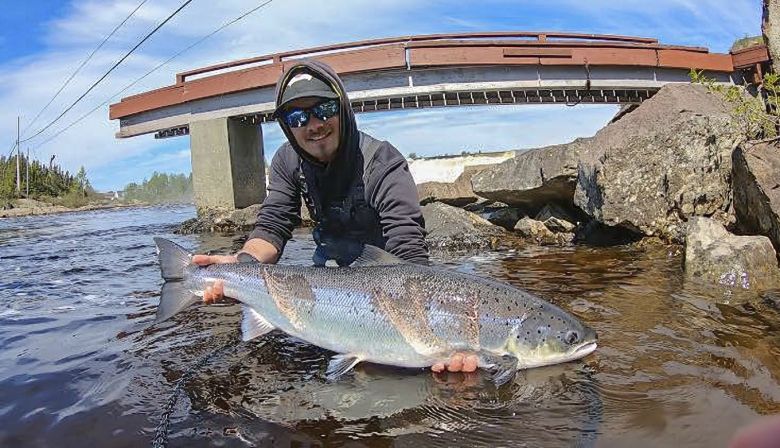

Les niveaux d’eau continuent d’être une préoccupation sur les rivières du Québec.
Cependant, les nouvelles encourageantes se poursuivent avec des rapports en provenance des régions que les montaisons vont bon train.
Dans le bas Saint-Laurent, la Causapscal, a poursuivi sur sa lancée depuis la semaine dernière malgré une chute rapide du débit d’eau. À ce jour, les saumons sont coopératifs et preneurs. À date, les pêcheurs ont gracié plus de saumon que récolté. Soit, 39 saumons par rapport à 35 à la même date l’an dernier.
Un problème d’infrastructure qui affectait l’accès des saumons de la rivière Mitis de franchir le piège en aval de la station Mitis-2 au cours des dernières années a été, espérons-le, résolu avec la construction de nouvelles infrastructures permanentes qui semblent fonctionner correctement à ce jour. Le premier saumon a franchi le piège le 6 juin dernier.
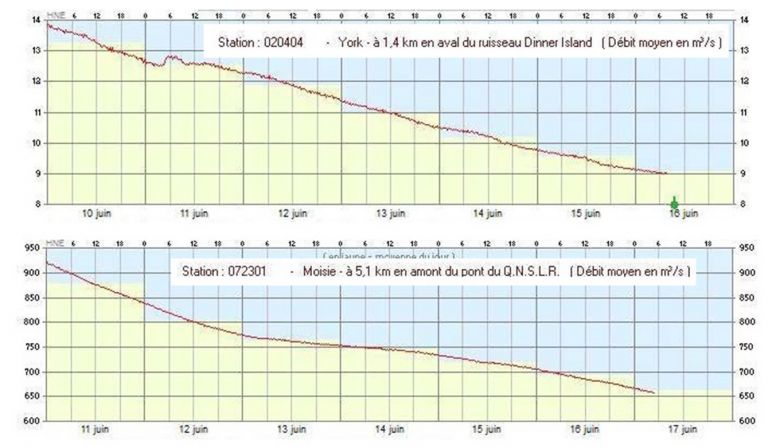
En Gaspésie, les saumoniers signalent également du succès et de nombreux grands saumons ont été relâchés. Les pêcheurs de Cascapédia signalent également une augmentation du nombre de poissons dans la rivière.
Les résultats du camp Micmac de la Cascapédia sont affichés fièrement sur leur page Facebook.
https://www.facebook.com/Micmac-Camp-199352133438454
APRM (Association de protection de la rivière Moisie) annonce à ce jour, pour le tronçon de la rivière qu’elle gère, que 40 saumons furent pêchés, dont 29 remises à l’eau, 10 saumons récoltés et 1 saumon noir.
Les pêcheurs de la rivière Aux Rochers ont également débuté leur saison en enregistrant les premières prises de la saison ainsi que sur la rivière Godbout qui connait une bonne montaison à la mi-juin.
Niclas Boucher de Sept-Îles a récemment visité la rivière York à Gaspé, y a relâché un saumon puis a regagné la Côte-Nord en moins de 24 heures et a rapidement relâché un saumon de la rivière Aux Rochers.

The Tornionjoki, named the Torn in Swedish, is the powerhouse for Atlantic salmon production in the Baltic. In a very good year more than 100,000 adult salmon return. So far in 2020 counting started late due to the Covid-19 Pandemic, and so far there have been about 1,500 return. This is in line with the 2017 returns, lowest in the last five years.
The Simojoki is another story. In a good year it has about 5,000 return. So far the counts are in line to be the second best of the last five years, with 1,277 so far.
The counts are made with “sonar-like” technology.
